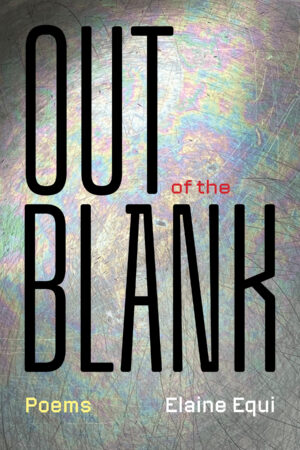In Their Own Words
Elaine Equi on “Maple”

Maple
Leave me alone with a jug of this syrup and who knows what maple mayhem I’ll get into.
Once someone asked me for my favorite word. I wanted to say “malice” but that sounded too mean, so I gave them “maple.”
It did the trick – totally threw them off the scent of my aggression.
But I honestly do love maple, with its high-pitched sweetness, so piercing only a dog can hear it.
The taste speaks to some darkness deep in my soul where a sleepwalker stands bathed in the light of an open refrigerator, swigging the sticky liquid, like bourbon, straight from the bottle.
“I am drinking the blood,” she chants. “I am drinking the blood of the forest.”
From Out of the Blank (Coffee House Press, 2025). Reprinted with permission of the publisher.
On “Maple”
Food writing is one of my favorite genres. I read it obsessively even though I can barely cook and, after years of various allergies, am a decidedly unadventurous eater. Perhaps it serves as a literary condiment to enhance my rather bland diet. Occasionally I’m tempted to try writing about food myself—not professionally, poetically. Over the years, I’ve written about lemons, corn, fennel, almonds, rhubarb, radishes, and chocolate sorbet. It’s a pattern. I focus on a single ingredient, not only to describe the taste, but also to extract whatever memories and associations I can from it. My poem, “Maple,” begins with a personal anecdote. When I was a younger poet doing a reading at an out-of-town college, someone did ask what my favorite word was. For some unknown reason, “malice” popped into my head, glittering like the Snow Queen’s frozen palace. I hesitated to say it because I wanted to appear friendly, warm, and engaging; not vindictive, vengeful, or unhinged. So instead, I ended up saying “maple." Admittedly, an odd choice, but certainly sweet enough. Maybe I was one of those autumn-loving poets, or maybe I was Canadian, or maybe I simply liked pancakes.
Today, whenever I read this poem at readings, it usually gets a lot of laughs. Everyone recognizes that it’s about repression and can relate to how we often need to mask our feelings in social situations. I even think that perhaps the poem expresses a proportionate relationship. The darker the emotions, the more intense the sweetness needs to be to cover them up—hence the appeal of maple syrup.
It turns out, however, that maple has a dark side of its own. When Googling the symbolism of maple trees, I recently discovered that in ancient Greece, they were associated with Ares, the god of war, because of their pointed leaves. There is also speculation that the Trojan Horse was made, at least in part, with maple wood. I find it interesting and a little surprising that in writing about my experience of maple, I unconsciously tapped into this aspect of its mythos.
Looking at maple from a different perspective, Native Americans have always considered it an important food and gift. Legend has it that at one time, syrup flowed through the trees year-round. As a result, people became lazy, lying beneath the trees with their mouths wide open, oblivious to their responsibilities. Seeing this, the Creator added water to the trees’ roots to thin the sap and make it less potent.
I myself have often sensed something wild and uncontrollable beneath the apparent sweetness of maple. That’s why it was fun to write about as if it were a dangerous substance. I like drinking it too—not straight from the bottle as the woman in my poem does—but poured over a couple of shots of espresso, milk, and ice. A maple latte isn’t something I have all the time. But it can be extremely fortifying, especially if you’re having a bad day, to feel “the blood of the forest” in your veins.



